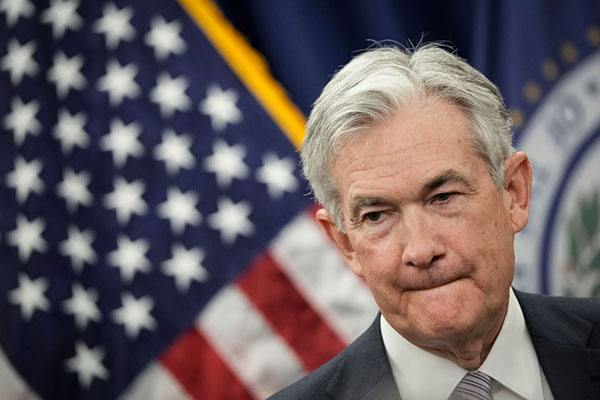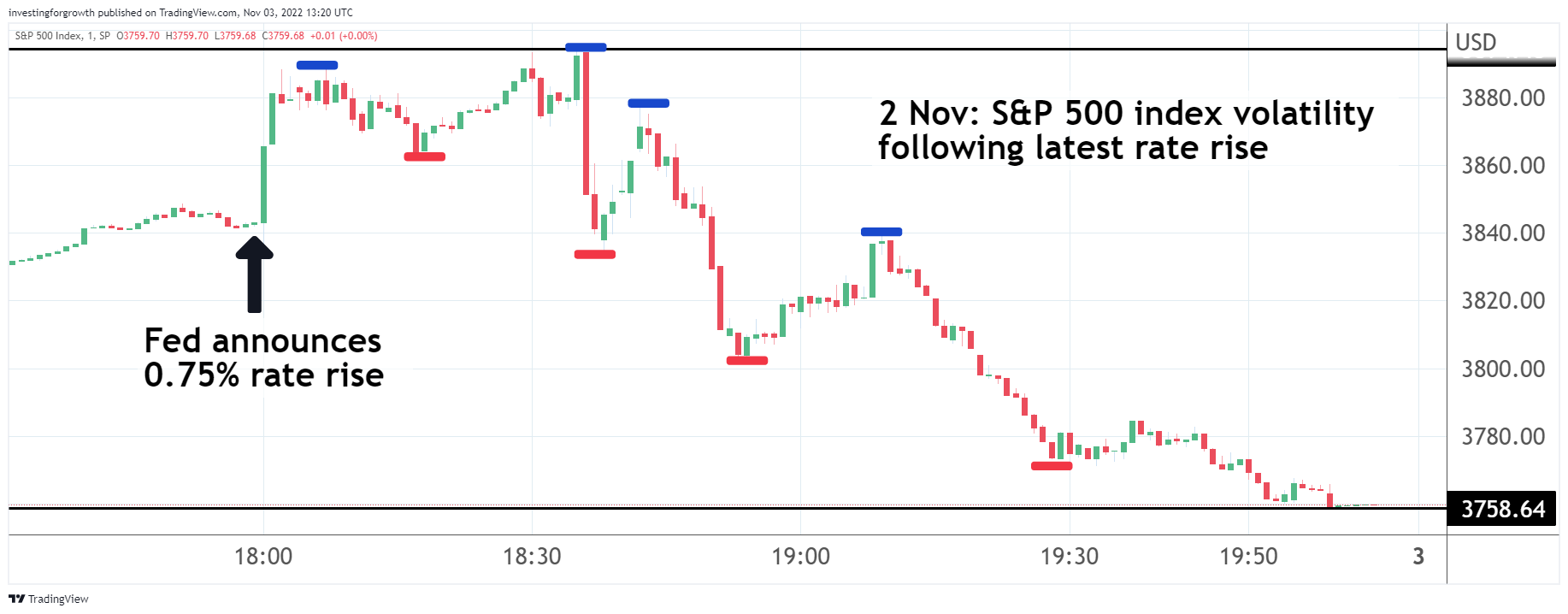Investors stunned as Federal Reserve issues threat in war on inflation
3rd November 2022 13:29
by Graeme Evans from interactive investor
Another 0.75% increase in US interest rates was almost guaranteed, but the Fed chairman’s comments has caused significant stock market volatility.

The reality check for financial markets continued today after the US Federal Reserve’s latest outsized rates rise last night came with a warning that the fight against inflation is far from over.
Fed chair Jerome Powell’s message punctured October’s stunning Wall Street stock market turnaround, which had been built on hopes for a slowing in the pace of monetary tightening.
Powell called talk of a pause in rate hikes “very premature” and went further than expected by signalling the ultimate level of interest rates may be higher than current forecasts.
- Discover more: Buy international shares | Interactive investor Offers | Most-traded US stocks
The Fed’s fourth consecutive 0.75% rise left the funds rate in a range of 3.75%-4%, with the prospect of another move of at least 0.5% in December, leaving some economists forecasting an eventual rate of over 5% by next year.
The US dollar rallied and Wall Street shares sold off sharply after Powell’s press conference, reversing the trends seen just a few moments earlier after the Fed decision hit the wires.
A pledge that committee members would factor in lags in the impact of monetary policy triggered the brief flight to risk on hopes that the Fed was teeing up a long-awaited pivot.

Deutsche Bank strategist Jim Reid said: “This rally was short-lived, however, as Powell stepped up to the mic and quickly disabused any interpretation that suggests a pause was forthcoming.”
In his press conference, Powell said: “At some point, as I’ve said in the last two press conferences, it will become appropriate to slow the pace of increases, as we approach the level of interest rates that will be sufficiently restrictive to bring inflation down to our 2% goal. There is significant uncertainty around that level of interest rates. Even so, we still have some ways to go, and incoming data since our last meeting suggest that the ultimate level of interest rates will be higher than previously expected.”
The fallout from his comments, particularly “some ways to go”, has left US markets facing a lacklustre session Thursday, having seen the S&P 500 and Nasdaq Composite fall 2.5% and 3.4% respectively last night.
The Dow Jones Industrial Average, which rose 14% in October during its best month since 1976, fell more than 1.5% yesterday, and European markets were also hit as the prospect of US rates staying higher for longer fuelled global recession fears. Technology stocks were among the casualties after the 10-year Treasury bond yield rose back towards its 15-year peak.
- A share to buy, another to sell and one to hold
- Terry Smith tech-buying spree continues with Apple purchase
- ii view: Apple breaks records
- A tech stock as cheap as chips?
On the Nasdaq 100 index, Airbnb (NASDAQ:ABNB) fell 13%, Tesla (NASDAQ:TSLA) 5.6%, Amazon (NASDAQ:AMZN) and Netflix Inc (NASDAQ:NFLX) 4.8%, and Google owner Alphabet (NASDAQ:GOOGL) almost 4%. Elsewhere, Disney (NYSE:DIS), Nike Inc Class B (NYSE:NKE) and Visa Inc Class A (NYSE:V) all fell 3% or more.
Over here, the FTSE 100 index dropped 44 points to below 7,100, but the support of a weaker pound for its large number of overseas-earning stocks meant the top flight’s performance was better than that seen for the FTSE 250 index and markets in Frankfurt and Paris.
Attention now turns to the two sets of US inflation and jobs market figures before the Federal Reserve’s next meeting on 14 December. The uncertainty and speculation over how high rates might go mean financial markets are likely to be vulnerable to more stress.
UBS Global Wealth Management believes the conditions are not yet in place for a sustained stock market rally, given that the Fed and other central banks are likely to keep tightening rates until the first part of 2023.
Its chief investment officer Mark Haefele said: “The Fed’s decision and latest guidance are consistent with our recent view that it is too early to position for a dovish pivot in monetary policy.
“Fed officials indicated that such a shift would require consistent evidence that inflation pressures are abating and that the labour market is cooling. Neither of these conditions have so far been met.”
UBS expects global earnings per share to fall by 3% in 2023, versus the bottom-up consensus for 5% growth. Haefele added: “Given the potential for periodic bounces, we have favoured strategies that add downside protection while retaining upside exposure.”
These articles are provided for information purposes only. Occasionally, an opinion about whether to buy or sell a specific investment may be provided by third parties. The content is not intended to be a personal recommendation to buy or sell any financial instrument or product, or to adopt any investment strategy as it is not provided based on an assessment of your investing knowledge and experience, your financial situation or your investment objectives. The value of your investments, and the income derived from them, may go down as well as up. You may not get back all the money that you invest. The investments referred to in this article may not be suitable for all investors, and if in doubt, an investor should seek advice from a qualified investment adviser.
Full performance can be found on the company or index summary page on the interactive investor website. Simply click on the company's or index name highlighted in the article.